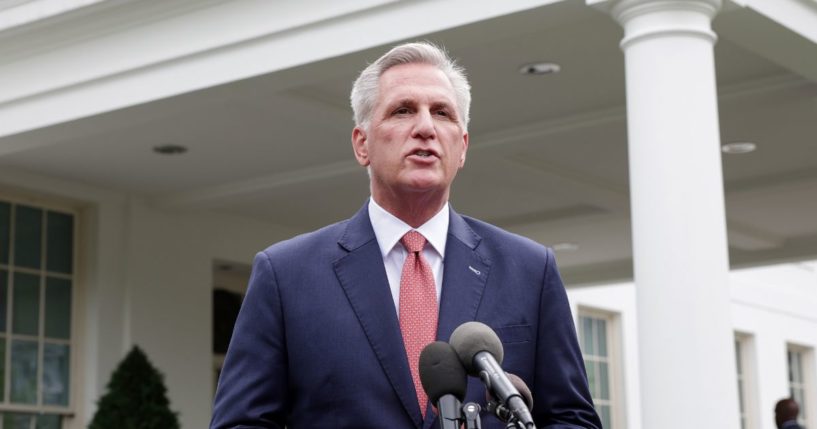
McCarthy: US Now Owes More Than Entire Economy Makes in Year, Can't Continue This Way
House Speaker Kevin McCarthy highlighted this week that the nation’s debt exceeds the size of the entire U.S. economy.
After meeting with President Joe Biden on Tuesday regarding raising the debt ceiling, McCarthy said to reporters, “The real question is, how much debt is too much? We’re at $32 trillion almost, 120 percent of our GDP. That means it’s larger than our economy by 20 percent.”
The only other time this has happened in modern history was in 1946 in the immediate aftermath of World War II, when the U.S. debt to GDP ratio stood at 106 percent, according to The Wall Street Journal.
McCarthy further noted the U.S. has already borrowed $1 trillion in the current fiscal year, which ends on Sept. 31.
The Congressional Budget Office projected this month that the deficit will be $1.5 trillion for the year, up from February’s forecast of a $1.4 trillion shortfall.
The CBO also calculated that deficits will average $2 trillion per year for the next 10 years under current spending policies.
House Republicans have acted to responsibly raise the debt limit. Only 16 days remain until President Biden becomes the first president in American history to default on the national debt. https://t.co/v8NXVRKXRM
— Kevin McCarthy (@SpeakerMcCarthy) May 16, 2023
McCarthy explained the nation’s fiscal situation on Fox News’ “Hannity” on Wednesday, saying, “You can’t keep raising the debt ceiling. It’s like having your child have a credit card and year after year after year, you keep reaching the limit and you just keep expanding it, expanding it.
“Well, there comes a point where your credit card now costs you more than all the money you make in a year, bigger than your entire economy. You’re responsible for paying it, but shouldn’t you actually look [at] how you’re spending money?” the speaker asked.
The national debt is like a credit card. Year after year after year, Washington keeps hitting the limit, so they just keep expanding it.
Now, America’s credit card debt is higher than what we make in an entire year.
Shouldn’t we reevaluate how Washington is spending your money? pic.twitter.com/seRKXApYvg
— Kevin McCarthy (@SpeakerMcCarthy) May 19, 2023
McCarthy touted the House’s Limit, Save, Grow Act, which the Republican-controlled Congress passed last month.
Hannity pointed out that the CBO estimated that the Republicans’ plan would save $4.8 trillion in federal spending over the next decade.
The bill suspends the nation’s debt ceiling through March 2024 or until the debt increases by $1.5 trillion, whichever comes first, in exchange for setting fiscal year 2024 discretionary federal spending at fiscal year 2022 levels.
It also sets a 1 percent growth cap on federal spending over the next decade and includes a work requirement for some who receive welfare payments.
“So limit, save, grow. We limit how much we spend in the future. We save money by pulling back that COVID money that wasn’t spent. We put in work requirements. This is only for able-bodied people with no dependents. It helps take them from poverty to jobs. [It] helps them get out of that poverty mess,” McCarthy said.
Finally, the bill would cut regulations and encourage domestic energy production, which Biden had curtailed through executive orders, greatly limiting oil exploration on federal lands and offshore.
Treasury Secretary Janet Yellen said in a May 1 letter to McCarthy that the federal government could lack sufficient funds to pay all its bills as early as June 1, though she indicated in a Monday letter the date could be “a number of days or weeks later” than her original estimate.
With Congress under Democratic control and with Biden in the White House, the federal government spent $6.27 trillion during FY 2022. That is up from $4.4 trillion during the Trump administration in FY 2019 prior to the pandemic and not far below the $6.6 trillion spent in FY 2020 during the height of it.
Biden’s FY 2024 budget submitted to Congress in March calls for $6.8 trillion in spending.
Economists have pointed to the massive deficit spending in recent years as a primary cause of the high inflation the nation has experienced since Biden took office.
Biden expressed confidence on Wednesday before departing for the G7 summit in Japan that a debt ceiling deal could be reached in time.
McCarthy is also hopeful based on how talks are going between members of his staff and the president’s.
The speaker told reporters on Thursday, “We’re not there. We haven’t agreed to anything yet. But I see the path that we could come through.”
An Economist/YouGov poll published this week found McCarthy to be among the few top elected leaders in D.C. with a net favorable rating.
Forty percent hold a favorable view of him, while 36 percent view him unfavorably.
Meanwhile, Biden is underwater, with 50 percent viewing him unfavorably and 47 percent favorably. Senate Majority Leader Chuck Schumer sat at an even 40-40 split.
The poll was conducted among 1,500 U.S. citizens from May 13 to 16 with a margin of error of +/- 2.8 percent.
A version of this article originally appeared on Patriot Project.
Truth and Accuracy
We are committed to truth and accuracy in all of our journalism. Read our editorial standards.
Advertise with The Western Journal and reach millions of highly engaged readers, while supporting our work. Advertise Today.












